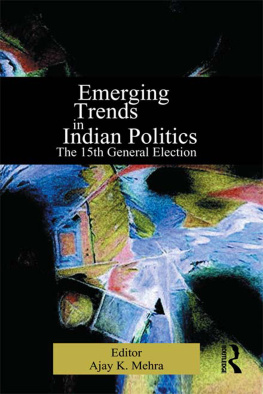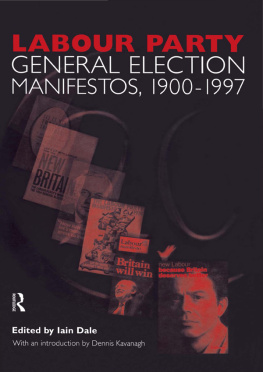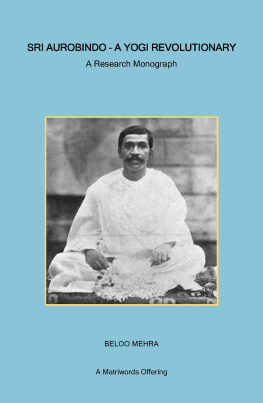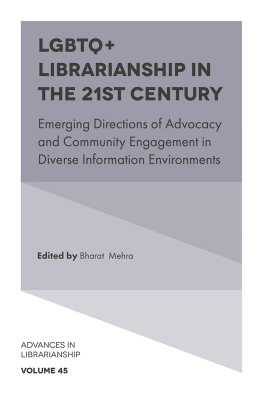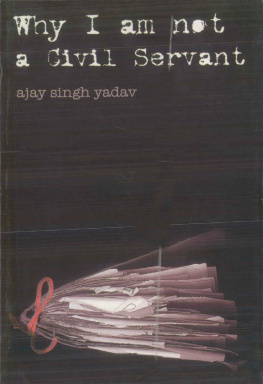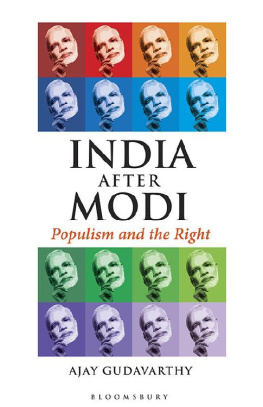First published 2010
by Routledge
912915 Tolstoy House, 1517 Tolstoy Marg, New Delhi 110 001
Simultaneously published in the UK
by Routledge
2 Park Square, Milton Park, Abingdon, Oxon, OX14 4RN
Routledge is an imprint of the Taylor & Francis Group, an informa business
Transferred to Digital Printing 2010
2010 Centre for Public Affairs
Typeset by
Star Compugraphics Private Limited
D-156, Second Floor,
Sector 7, Noida
All rights reserved. No part of this book may be reproduced or utilised in any form or by any electronic, mechanical or other means, now known or hereafter invented, including photocopying and recording, or in any information storage and retrieval system without permission in writing from the publishers.
British Library Cataloguing-in-Publication Data
A catalogue record of this book is available from the British Library
ISBN: 978-0-415-56319-2
Foreword
On 26 January 1950, the Constitution of India came into force, declaring the country a Sovereign Democratic Republic. I remember I was then a first-year student at the Government Law College, Mumbai. The city wore a festive look as buildings were tastefully decorated to mark the occasion. My friend Anil Divan and I walked in front of Victoria Terminus railway station, the faade of which had been brilliantly illuminated. Anil started counting the number of lights and we wondered if the number was larger than that of the inhabitants of the city. The illumination in the night only reminded us of the darkness that prevailed in many parts of the country the darkness of poverty, illiteracy and deprivation. Since then, sincere efforts have been made to elect people's representatives by holding general elections to the country's Parliament and to state Llegislatures. Also, there have been efforts to achieve progress in every field and to secure welfare of all the citizens, especially of the Scheduled Castes, Scheduled Tribes and weaker sections of the society.
In more than half a century, the electoral politics of the country has undergone far-reaching changes. One-party domination has given way to coalition politics, thus opening up possibilities of parties coming together with certain common minimum programmes. The voices of Dalits, tribals and minorities have become louder and clearer; people living on the margins have asserted their rights in the Indian political system. Regionalism has emerged as a determining factor in certain states which demand more autonomy. Internal security matters, foreign policy issues and issues relating to economy and development have assumed significance. This book deserves to be read in the context of all these issues and developments. There is a perceptible change in the voters minds as they have increasingly voted for stability, ignoring even anti-incumbency as well as divisive factors of religion or caste marginalising coalition politics.
This volume is the outcome of a study organised jointly by Heinrich Bll Stiftung (HBS) and the Centre for Public Affairs (CPA) before the 15th general elections to the Lok Sabha to gauge the emerging political trends that could influence the politics of the country. Focus was laid on certain key social, political and economic issues confronting the nation that could have a bearing on the elections.
The volume includes, besides an introduction, 13 articles contributed by eminent scholars, academicians and media persons, each article highlighting a key social, political or economic issue which could potentially influence the poll outcome. The article on the significance of the delimitation of constituencies outlines its implications for political parties and candidates. The fourth Delimitation Commission had completed the exercise of redrawing the territorial boundaries of electoral constituencies in India, an exercise undertaken after over three decades. Issues such as global recession affecting jobs in the country, slowing down of economy under the impact of international meltdown, natural calamities adversely affecting agriculture and poverty alleviation measures are discussed in another article. The political roles of four groups Muslims, Dalits, tribals and women analysed in four separate articles show how they influenced the electoral and political processes. Since elections have been contested in geographically defined constituencies, regional and local issues have always assumed considerable importance. The significance of the forces of regionalism and autonomy is the subject of another study. Internal security issues in the context of jihadi groups operating in different parts of the country, acts of insurgency and Naxal threats are dealt in detail in another article. The growing influences of the corporate sector, print and electronic media, foreign policy and the diaspora on electoral politics are discussed in separate articles. All these articles taken together outline the factors that could shape the mood of the electorate.
Democracy has struck deep roots in our country. General elections have been conducted as many as 15 times, all successfully, to elect people's representatives who would be responsible for legislation and governance. The nation has witnessed smooth transfer of power in the event of one party or an alliance failing to secure the mandate of the electorate. All the three wings of government the executive, the legislative and the judiciary are contributing to the smooth functioning of a vibrant democracy. I have the good fortune of serving on all these three wings. As a lawyer, I have tried to strengthen the wings of judges to fly high in the sky of justice. As the Chairman of UNESCO Appeals Board, I have presided over a judicial body. As a member of the Parliament, I was a part of the legislature. Now, as the governor of a state, I have the rare opportunity to head its executive. From my own experience, I can say with confidence that democracy is here to stay, not only as a political system but as a way of life. With its diversity and plurality, India will remain the largest and strongest democracy in the world.
This book, which is the result of diligent research, serves to deepen our understanding of the working of Indian democracy. I hope readers, especially students and scholars, will immensely benefit from this volume.
Murlidhar C. Bhandare
Governor, Orissa
Preface
Towards the end of 2007, when the Heinrich Bll Stiftung (HBS) approached our Centre for Public Affairs (CPA) to organise a study before the 15th general elections to gauge the emerging political trends that could influence the politics of the country, we were a little skeptical. As a collective of social science researchers we had neither been into psephology nor political forecasting. Our prime forte was research-based political analysis. Still, when the CPA team brainstormed with the HBS, a few baselines emerged to focus on certain critical social, political and economic issues the country faced that could matter in the elections which were to involve a mammoth 714 million-strong voting public.
The methodology agreed upon was that the CPA team would identify close to 15 issues to be assigned each to one researcher. These 15 scholars then would critique each other's approach, methodology and research subject at two stages before the whole study was put up to a larger audience for constructive criticism. The entire exercise was originally planned to be completed before the elections. But because of the seriousness of the effort this could not be achieved, for otherwise it would have been a hurried and superficial job. The outcome of the exercise that started before the elections and ended after them are here before the readers for their scrutiny.


